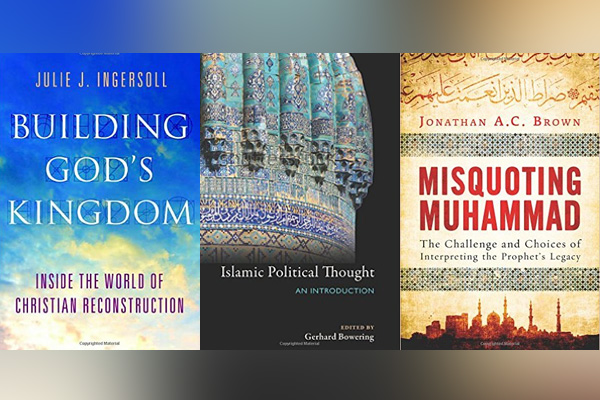
These 3 Books Describe the Push to Bring Religion Back into Government
- By Alison Lesley --
- 22 Jul 2015 --

Various Christian and Islamic groups think secular government has failed and its time to go back to a religion influenced government. Books on this topic by Julie Ingersoll, Gerhard Bowering, and Jonathan A.C. Brown are analyzed.
Several religious groups and idealists have been critical to the failures of secular governments in handling political and civic affairs which oftentimes results to crime, chaos, and even war. Thus, such groups push for the rebuilding of society from scratch and according to theocratic ways. According to them, it is better to run the government and society according to the original religious laws instead of the current and liberal legal systems which are heavily flawed.
In the Christian world there’s the Christian Reconstructionists, while for Muslims, there’s a variety of fundamentalists and idealists. Perhaps, the most extreme, radical, and popular today are ISIS and the Taliban. To be able to understand these groups and the various reasons that triggered the momentum of fundamentalist campaigns across the major religions, it is worth it to have a look at the following three books:
Building God’s Kingdom: Inside the World of Christian Reconstruction by Julie Ingersoll
In this book, Julie Ingersoll proves that extreme right movements in religion are not only present in the Muslim world but even to the west and Christian societies as well. In the United States, the Christian Reconstructionist movement founded by Rousas John Rushdoony is spearheading the campaign to bring back the old-time Christian religion. According to Rushdoony, secular politics and morality have gravely failed humanity so it’s about time to run the world according to God’s will.
The Reconstructionists’ efforts do not only target the current leaders but also focus on the grass roots, the family, and young children through education. Amidst their small group size, they already have notable influences in US politics and legal issues including culture and the way of life. The movement is one of the main oppositions of the Homeschooling movement, became a major influence to the creationist movement, an inspiration for the American religious right, and noted to be influential to certain US politicians.
Islamic Political Thought: An Introduction by Gerhard Bowering
Some might consider the principles of certain Muslim groups to be radical and extreme. And this is what the book Islamic Political Thought by Gerhard Bowering tries to understand and explain. The current generation of Muslims are already critical and confused with the relationship of religion and politics. Bowering argues that Islam’s recent political history can provide clues as to what had happened.
According to Bowering, the Qur’an has no clear details when it comes to politics and governance. Thus in the recent years and centuries, several Muslim leaders and “scholars” sprouted to give their own interpretation of Islam’s political principles, some for the obvious reasons of authority and power. Bowering also added that Islam has evolved as a result of the religions’ mingling with other cultures and religions. This is evident during the time when Islam was creeping northwards to Europe, eastwards to Asia, and the neighboring Africa.
In the current social and political environment, ordinary believers are becoming less and less important or alienated. Thus, a lot of Muslims are calling for the revival of the “original” and uncorrupted faith.
Misquoting Muhammad: The Challenge and Choices of Interpreting the Prophet’s Legacy by Jonathan A.C. Brown
When you’re trying to find out more about the original and uncorrupted Muslim faith, this book of Jonathan Brown is a must read. In the book, Brown identifies several key moments when Islamic scholars debated for the right interpretation of what the Qur’an says. The book cites several examples like the “wife-beating verse”. Brown simply wants to emphasize the fact that there’s also a tendency for scholars to interpret the Qur’an in a different manner, at times, in a conflicting manner than its true message.


















